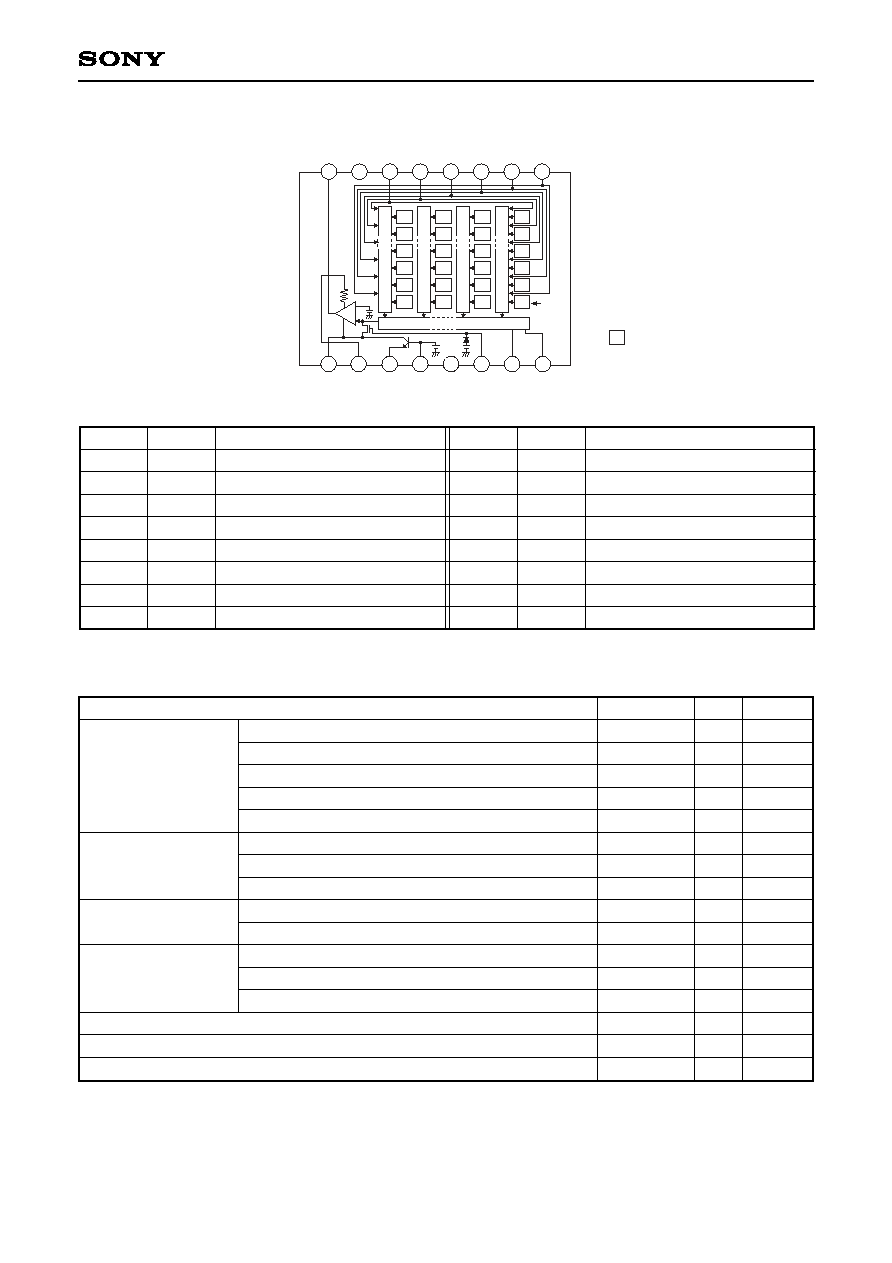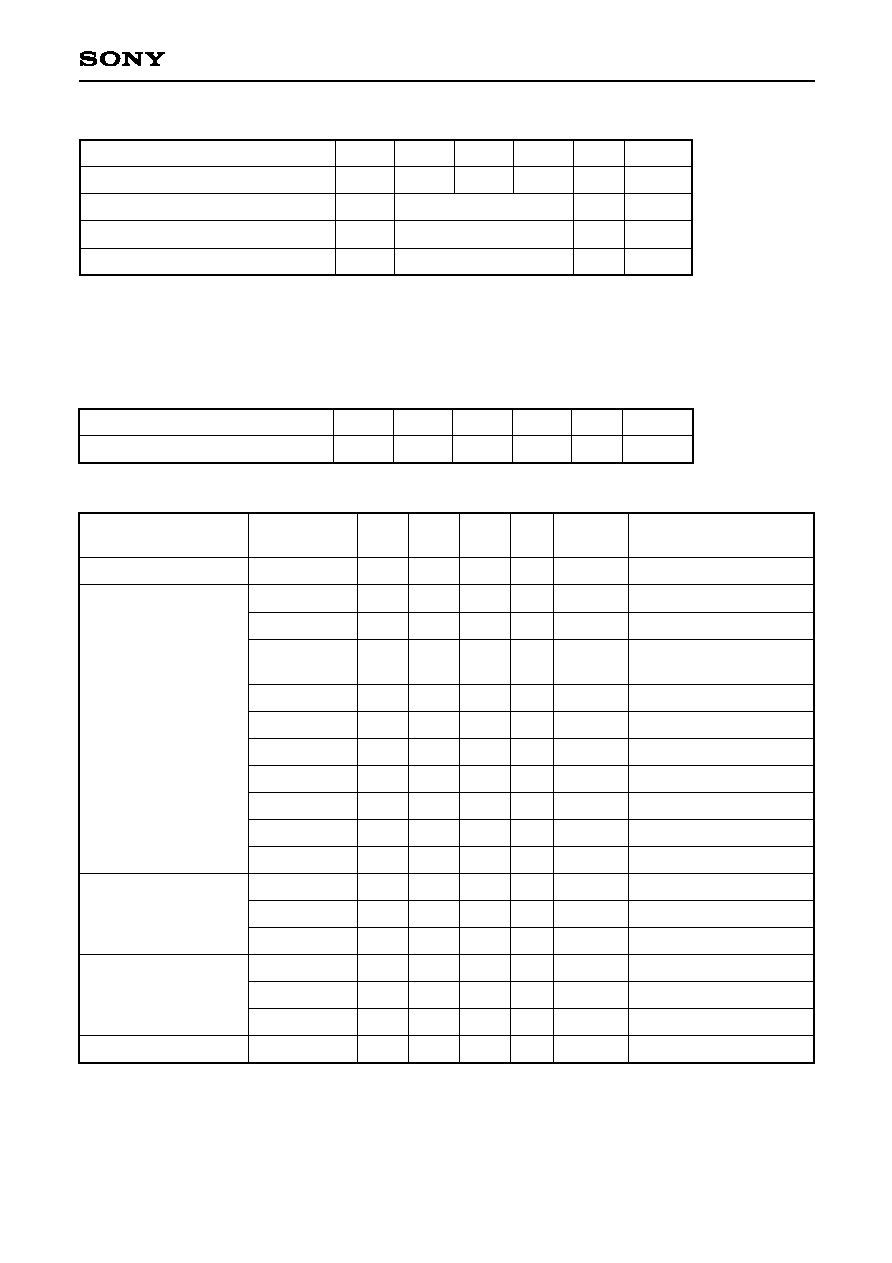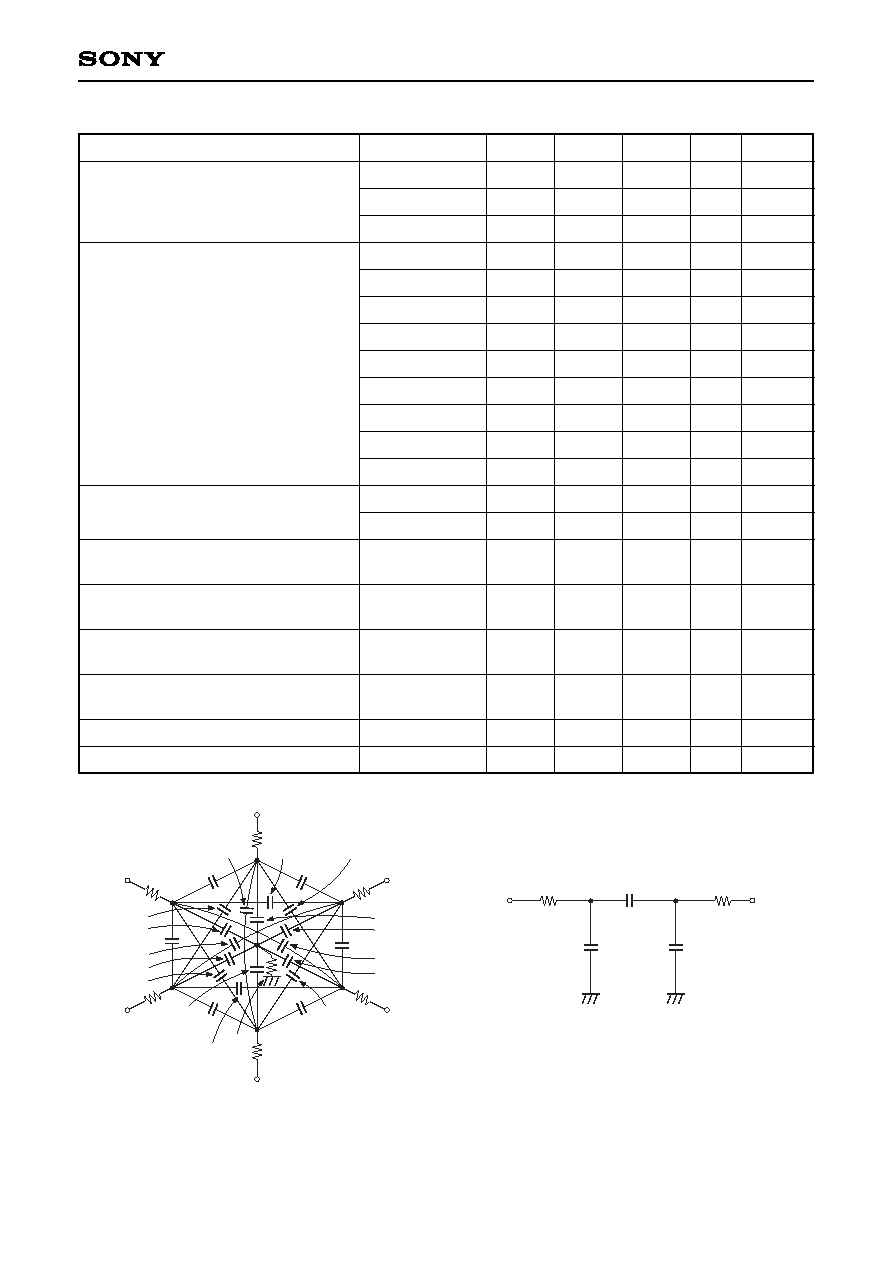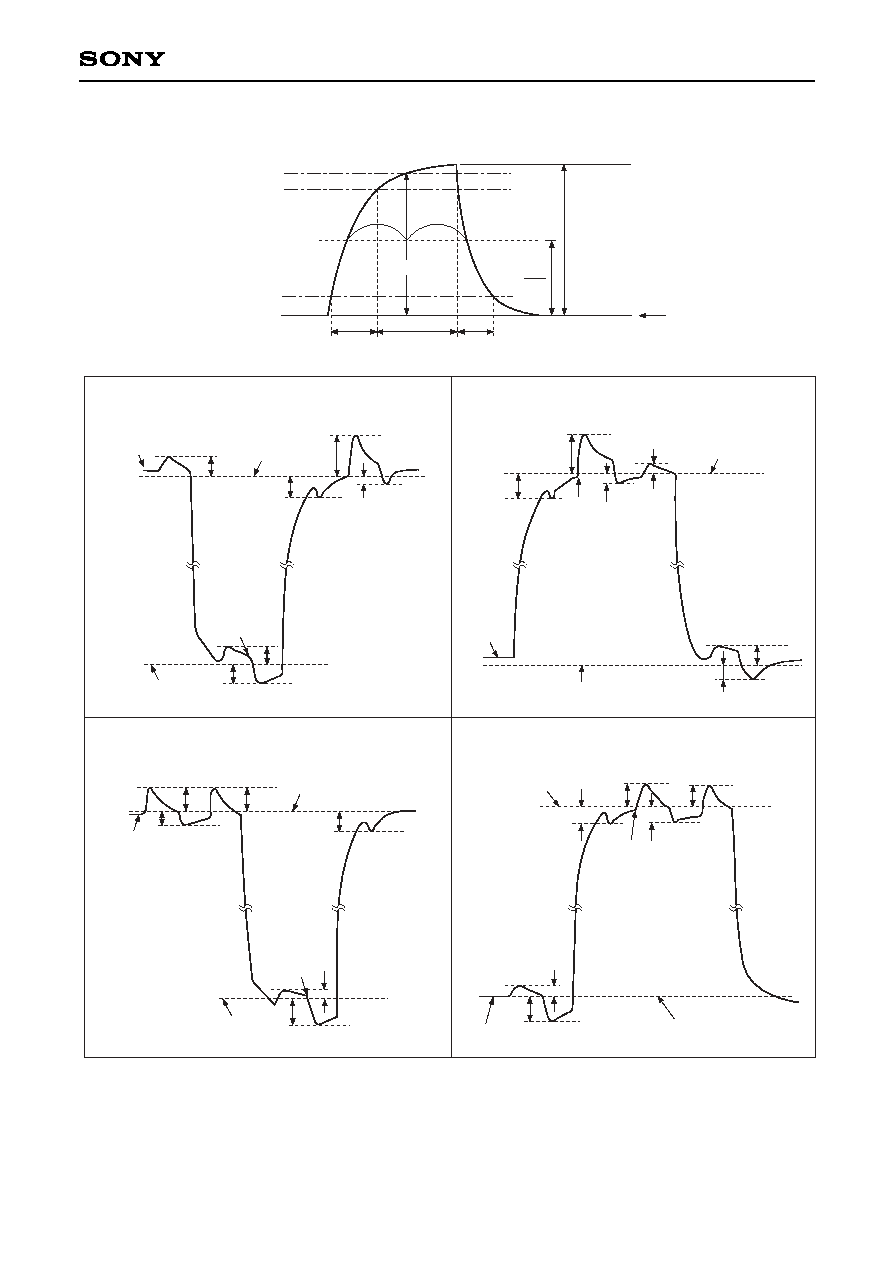ICX232BQ(E*)

Diagonal 5mm (Type 1/3.6) Frame Readout CCD Image Sensor with Square Pixel for Color Cameras
Description
The ICX232BQ is a diagonal 5mm (Type 1/3.6)
interline CCD solid-state image sensor with a square
pixel array and 1.25M effective pixels. Frame
readout allows all pixels' signals to be output
independently within approximately 1/7.5 second at
the horizontal drive frequency of 12.27MHz. Also,
the adoption of high frame rate readout mode
supports 30 frames per second which is four times
the speed in frame readout mode. This chip features
an electronic shutter with variable charge-storage
time. Adoption of a design specially suited for frame
readout ensures a saturation signal level equivalent
to when using field readout. High resolution and high
color reproductivity are achieved through the use of
R, G, B primary color mosaic filters. Further, high
sensitivity and low dark current are achieved through
the adoption of Super HAD CCD technology.
This chip is suitable for applications such as electronic
still cameras, PC input cameras, etc.
Features
· High sensitivity (+2.6dB compared with the ICX232AQ)
· High D range (+2.5dB compared with the ICX232AQ)
· Supports frame readout
· High horizontal and vertical resolution
· Supports high frame rate readout mode (30 frames/s)
· Square pixel
· Horizontal drive frequency: 12.27MHz
· No voltage adjustments (reset gate and substrate bias are not adjusted.)
· R, G, B primary color mosaic filters on chip
· High color reproductivity, high sensitivity, low dark current
· Continuous variable-speed shutter
· Excellent anti-blooming characteristics
· Horizontal register, reset gate: 3.3V drive
· Recommended range of exit pupil distance: 20 to 100mm
· 16-pin high-precision plastic package (top/bottom dual surface reference possible)
Device Structure
· Interline CCD image sensor
· Image size:
Diagonal 5mm (Type 1/3.6)
· Total number of pixels:
1343 (H)
×
972 (V) approx. 1.31M pixels
· Number of effective pixels: 1290 (H)
×
966 (V) approx. 1.25M pixels
· Number of active pixels:
1280 (H)
×
960 (V) approx. 1.23M pixels
(within type 1/4 = 4.5mm:
1152 (H)
×
872 (V) approx. 1.00M pixels)
· Chip size:
4.94mm (H)
×
4.20mm (V)
· Unit cell size:
3.125µm (H)
×
3.125µm (V)
· Optical black:
Horizontal (H) direction: Front 3 pixels, rear 50 pixels
Vertical (V) direction:
Front 4 pixels, rear 2 pixels
· Number of dummy bits:
Horizontal 30
Vertical 1 (even fields only)
· Substrate material:
Silicon
1
E01337A34
Sony reserves the right to change products and specifications without prior notice. This information does not convey any license by
any implication or otherwise under any patents or other right. Application circuits shown, if any, are typical examples illustrating the
operation of the devices. Sony cannot assume responsibility for any problems arising out of the use of these circuits.
ICX232BQ
16 pin DIP (Plastic)
Super HAD CCD is a registered trademark of Sony Corporation. Super HAD CCD is a CCD that drastically improves sensitivity by introducing
newly developed semiconductor technology by Sony Corporation into Sony's high-performance HAD (Hole-Accumulation Diode) sensor.
Pin 1
V
3
50
2
4
Pin 9
H
Optical black position
(Top View)

2
ICX232BQ
Pin No.
Symbol
Description
Pin No.
Symbol
Description
1
2
3
4
5
6
7
8
V
4
V
3A
V
3B
V
2
V
1A
V
1B
GND
V
OUT
Vertical register transfer clock
Vertical register transfer clock
Vertical register transfer clock
Vertical register transfer clock
Vertical register transfer clock
Vertical register transfer clock
GND
Signal output
9
10
11
12
13
14
15
16
V
DD
GND
SUB
C
SUB
V
L
RG
H
1
H
2
Supply voltage
GND
Substrate clock
Substrate bias
1
Protective transistor bias
Reset gate clock
Horizontal register transfer clock
Horizontal register transfer clock
Pin Description
Note)
: Photo sensor
V
OUT
GND
V
1B
V
1A
V
2
V
3B
V
3A
V
4
V
DD
GND
SUB
C
SUB
V
L
RG
H
1
H
2
B
G
B
G
B
G
G
R
G
R
G
R
B
G
B
G
B
G
G
R
G
R
G
R
Horizontal register
Note)
2
3
4
5
6
7
8
9
10
11
12
13
14
15
16
1
Vertical register
Block Diagram and Pin Configuration
(Top View)
1
DC bias is generated within the CCD, so that this pin should be grounded externally through a capacitance
of 0.1µF.
Absolute Maximum Ratings
40 to +10
50 to +15
50 to +0.3
40 to +0.3
25 to
0.3 to +18
10 to +18
10 to +5
0.3 to +28
0.3 to +15
to +15
5 to +5
13 to +13
30 to +80
10 to +60
10 to +60
V
V
V
V
V
V
V
V
V
V
V
V
V
°C
°C
°C
V
DD
, V
OUT
,
RG
SUB
V
1A
, V
1B
, V
3A
, V
3B
SUB
V
2
, V
4
, V
L
SUB
H
1
, H
2
, GND
SUB
C
SUB
SUB
V
DD
, V
OUT
,
RG, C
SUB
GND
V
1A
, V
1B
, V
2
, V
3A
, V
3B
, V
4
GND
H
1
, H
2
GND
V
1A
, V
1B
, V
3A
, V
3B
V
L
V
2
, V
4
, H
1
, H
2
, GND V
L
Voltage difference between vertical clock input pins
H
1
H
2
H
1
, H
2
V
4
Item
Ratings
Unit
Remarks
2
+24V (Max.) when clock width < 10µs, clock duty factor < 0.1%.
2
Against
SUB
Against GND
Against V
L
Between input clock
pins
Storage temperature
Guaranteed temperature of performance
+16V (Max.) is guaranteed for turning on or off power supply.
Operating temperature

3
ICX232BQ
Clock Voltage Conditions
Item
Readout clock voltage
V
VT
V
VH1
, V
VH2
V
VH3
, V
VH4
V
VL1
, V
VL2
,
V
VL3
, V
VL4
V
V
V
VH3
V
VH
V
VH4
V
VH
V
VHH
V
VHL
V
VLH
V
VLL
V
H
V
HL
V
CR
V
RG
V
RGLH
V
RGLL
V
RGL
V
RGLm
V
SUB
14.55
0.05
0.2
8.0
6.8
0.25
0.25
2.7
0.05
0.5
2.7
21.5
15.0
0
0
7.5
7.5
3.3
0
1.65
3.3
22.5
15.45
0.05
0.05
7.0
8.05
0.1
0.1
0.5
0.5
0.5
0.5
3.6
0.05
3.6
0.4
0.5
23.5
V
V
V
V
V
V
V
V
V
V
V
V
V
V
V
V
V
V
1
2
2
2
2
2
2
2
2
2
2
3
3
3
4
4
4
5
V
VH
= (V
VH1
+ V
VH2
)/2
V
VL
= (V
VL3
+ V
VL4
)/2
V
V
= V
VH
n V
VL
n (n = 1 to 4)
High-level coupling
High-level coupling
Low-level coupling
Low-level coupling
Cross-point voltage
Low-level coupling
Low-level coupling
Horizontal transfer
clock voltage
Reset gate clock
voltage
Substrate clock voltage
Vertical transfer clock
voltage
Symbol
Min.
Typ.
Max.
Unit
Remarks
Bias Conditions
Item
Supply voltage
Protective transistor bias
Substrate clock
Reset gate clock
V
DD
V
L
SUB
RG
14.55
15.0
1
2
2
15.45
V
Symbol
Min.
Typ.
Max.
Unit
Remarks
DC Characteristics
Item
Supply current
I
DD
4.0
mA
Symbol
Min.
Typ.
Max.
Unit
Remarks
1
V
L
setting is the V
VL
voltage of the vertical transfer clock waveform, or the same voltage as the V
L
power
supply for the V driver should be used.
2
Do not apply a DC bias to the substrate clock and reset gate clock pins, because a DC bias is generated
within the CCD.
Waveform
diagram

4
ICX232BQ
Clock Equivalent Circuit Constant
Item
Capacitance between vertical transfer
clock and GND
C
V1A
, C
V3A
C
V1B
, C
V3B
C
V2
, C
V4
C
V1A2
, C
V3A4
C
V1B2
, C
V3B4
C
V23A
, C
V41A
C
V23B
, C
V41B
C
V1A3A
C
V1B3B
C
V1A3B
, C
V1B3A
C
V24
C
V1A1B
, C
V3A3B
C
H1
C
H2
C
HH
C
RG
C
SUB
R
1A
, R
1B
, R
2
,
R
3A
, R
3B
, R
4
R
GND
R
H
390
1000
1000
82
220
39
82
8
62
22
30
22
27
27
56
5
270
51
18
4
pF
pF
pF
pF
pF
pF
pF
pF
pF
pF
pF
pF
pF
pF
pF
pF
pF
Capacitance between vertical transfer
clocks
Capacitance between horizontal transfer
clock and GND
Capacitance between horizontal transfer
clocks
Capacitance between reset gate clock
and GND
Capacitance between substrate clock
and GND
Vertical transfer clock series resistor
Vertical transfer clock ground resistor
Horizontal transfer clock series resistor
Symbol
Min.
Typ.
Max.
Unit
Remarks
R
GND
C
V1B3B
R
1B
C
V41B
V
1B
C
V4
C
V41A
C
V1B
C
V1B3A
C
V1A1B
C
V1A
C
V1B2
R
1A
V
1A
C
V1A2
V
2
R
2
C
V24
C
V1A3A
C
V23A
C
V23B
R
3A
V
3A
C
V2
C
V3A
C
V3A3B
C
V1A3B
C
V3B
R
3B
V
3B
C
V3A4
C
V3B4
V
4
R
4
Vertical transfer clock equivalent circuit
H
1
R
H
C
H1
C
H2
R
H
C
HH
H
2
Horizontal transfer clock equivalent circuit

5
ICX232BQ
Drive Clock Waveform Conditions
(1) Readout clock waveform
(2) Vertical transfer clock waveform
II
100%
90%
10%
0%
tr
twh
tf
M
0V
M
2
V
1A
, V
1B
V
3A
, V
3B
V
2
V
4
V
VHH
V
VH
V
VHL
V
VHH
V
VHL
V
VH1
V
VL1
V
VLH
V
VLL
V
VL
V
VHH
V
VH3
V
VHL
V
VH
V
VHH
V
VHL
V
VL3
V
VL
V
VLL
V
VLH
V
VHH
V
VHH
V
VH
V
VHL
V
VHL
V
VH2
V
VLH
V
VL2
V
VLL
V
VL
V
VHH
V
VHH
V
VHL
V
VH4
V
VHL
V
VH
V
VL
V
VLH
V
VLL
V
VL4
V
VH
= (V
VH1
+ V
VH2
)/2
V
VL
= (V
VL3
+ V
VL4
)/2
V
V
= V
VH
n V
VL
n (n = 1 to 4)
II
V
VT




